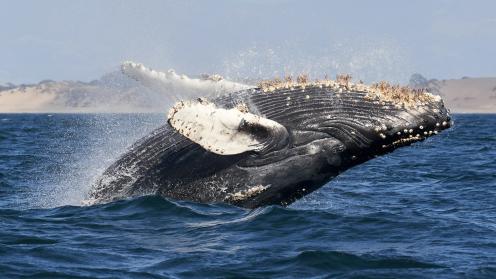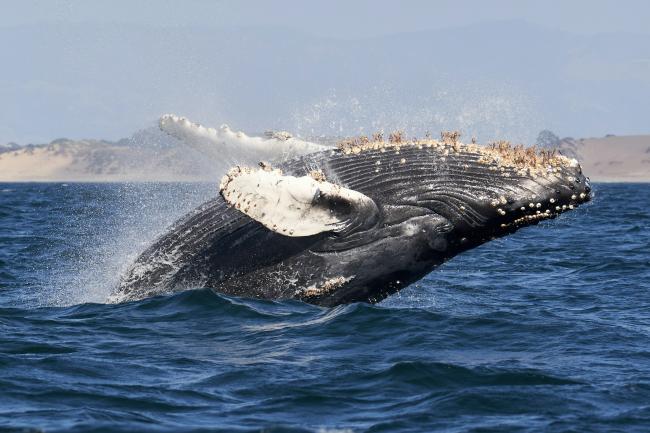About
Existential fault lines may remain, but the Commission’s civil and efficient deliberations resulted in some groundbreaking advances, demonstrating it can protect whales not only from hunting, but from other threats, including bycatch, entanglements, vessel strikes, climate change, underwater noise, and pollution.
Final report
Summary report 23–27 September 2024
All coverage
Whales have roamed the Ocean for more than 35 million years. Humans have been harvesting whales for the last 5-6,000 years. By the mid-1800s, the advance of faster ships and more effective killing techniques caused the number of whales to decrease precipitously. In addition to a sense of moral obligation to protect these majestic animals, an increased understanding of the ways that whales contribute to nutrient recycling, carbon sequestration, and marine biodiversity underscores the importance of their lives to the overall health of the Ocean.
The International Convention for the Regulation of Whaling (ICRW), signed in 1946, established the International Whaling Commission (IWC) as the body responsible to “provide for the proper conservation of whale stocks and thus make possible the orderly development of the whaling industry.” Eighty-eight member governments are parties to the Convention.
The ICRW recognizes three types of whaling: commercial, aboriginal subsistence, and by permit, usually for scientific research. The ICRW’s “Schedule” sets out measures for the management and conservation of whales that address:
- protection of certain species or stocks;
- designation of areas as whale sanctuaries;
- limits on numbers and size of whales that may be taken;
- establishing open and closed seasons and areas for whaling;
- protection of calves and females accompanied by calves; and
- restrictions on hunting methods.
In 1982, in response to continued declines in whale numbers and growing public pressure, the Convention adopted a moratorium on commercial whaling, which came into effect in 1986. Three countries still conduct commercial whaling under their own management practices: Iceland, Norway, and Japan. Iceland and Norway lodged official objections when the moratorium was adopted and are still members of the Convention. Japan continued to whale under a special permit, until 2019, when it withdrew from the Convention.
Four countries conduct aboriginal subsistence whaling pursuant to IWC provisions that establish annual quotas: Denmark (Greenland), Russian Federation (Chukotka), St. Vincent and the Grenadines (Bequia), and the United States (Alaska). Whaling under the scientific research permit process has been contentiousness; a 2014 ruling by the International Court of Justice ordered Japan to cease its Southern Ocean whaling program.
A longstanding dichotomy persists among IWC members regarding commercial whaling. Those advocating for an end to the moratorium say the Convention’s purpose is to regulate, not cease whaling, and point to the evidence of sustainable harvests. Those who favor retaining the ban argue that some whale populations remain at historic lows, and emphasize the need for expanded conservation efforts to address bycatch, entanglement, underwater noise, ship strikes, marine debris, and climate change impacts. Another issue centers on the proposed South Atlantic whale sanctuary. Consideration of the proposal during the 68th Commission Meeting surfaced the need to address procedural rules related to quorum requirements.
The first agenda item at the 69th Commission Meeting (IWC-69) will consider what quorum is required to start a meeting and for decision making. IWC-69 will also address the following agenda items:
- work of the Scientific Committee;
- work of the Conservation Committee;
- aboriginal subsistence whaling quotas and practices;
- creation of a South Atlantic whale sanctuary;
- resolutions on food security, the whaling moratorium, and international legal obligations;
- whale killing methods and welfare issues;
- management issues and infractions;
- cooperation with other organizations;
- finance and administration of the IWC;
- voting rights; and
- IWC Bureau membership.
The IWC Biennial Commission Meeting convenes from 23-27 September 2024 in Lima, Peru.
The Earth Negotiations Bulletin (ENB) writers for this meeting are Teya Penniman; Kate Harris; and Jose F. Pinto-Bazurco, Ph.D. The Digital Editor is Ángeles Estrada. The Editor is Pam Chasek, Ph.D.
View past and future events
To receive free coverage of global environmental events delivered to your inbox, subscribe to the ENB Update newsletter.

